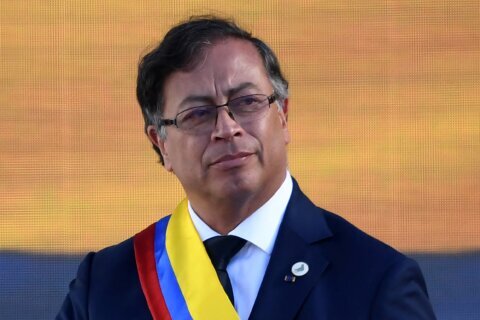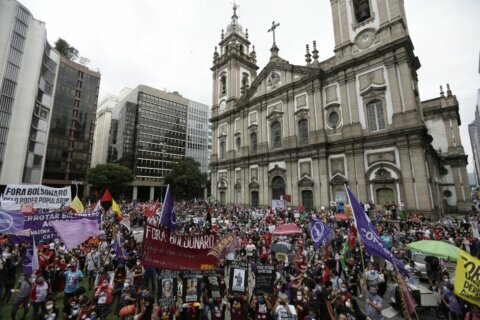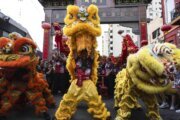Six weeks after Juan Guaido declared himself Venezuela’s President, US lawmakers are wrestling with the possibility that momentum behind his political movement could stall and the question of how to respond as the crisis ripples regionwide.
One reason: The Venezuelan people, once residents of Latin America’s wealthiest country, may be too weakened by starvation to take to the streets for much longer, one expert told the Senate Foreign Relations subcommittee on Latin America.
“People who are starving do not mobilize in the streets,” Cynthia Arnson, director of the Latin America Program at the Wilson Center, told the subcommittee on Thursday. “There is actually widespread starvation.”
‘Hurting stalemate’
Embattled President Nicolas Maduro shows no signs of losing the critical support of elites and the military since Guaido’s January 23 declaration, leading experts to warn that the situation could be settling into a “hurting stalemate” — a standoff in which neither side can win and neither will agree to back down.
The impasse poses a test for the Trump administration, whose aggressive challenge to the Maduro regime has wide bipartisan and international support but has yet to peel away Maduro’s power base. Now, time and the sheer daily suffering in Venezuela, where the average person lost 24 pounds last year and 90% live in poverty, according to subcommittee Chairman Marco Rubio, are becoming obstacles.
“The widespread opposition that President Guaido has been able to mobilize may not last,” Arnson told lawmakers, one of whom made the comparison to Syrian President Bashar al-Assad, who has clung to power despite years of US attempts to unseat him.
While the Maduro regime thinks that it can wait this crisis out, Arnson said, when it comes to the 35-year-old Guaido, “time may not be on his side.”
‘We are not going to forget’
Rubio made clear that US will sustain its campaign against Maduro, telling Venezuelans directly that “the free world will not forget you. Maduro believes he can wait it out, but we are not going to forget,” adding that the US will stick with the fight for “as long as it takes.”
The Florida Republican declared the Maduro regime “a clear danger and threat” to the US, while Democratic Sen. Ben Cardin of Maryland and others flagged the dangers to the region, as floods of desperate Venezuelans seek refuge in neighboring countries. The economic fallout will have longer-term political ramifications, Arnson warned, pointing to the rise of populist parties in Europe in the wake of immigrant flows from war-torn Syria and Iraq.
Republican Sen. John Barrasso of Wyoming invoked Syria, noting that “the world saw the Assad regime stay in power propped up by Russia and Iran,” both of which also back Maduro.
The comparison came up again later in the hearing when Arnson noted that “it is possible that (the Maduro regime) will survive much as Assad’s Syria has survived,” turning to allies like Russia and Libya for support and becoming more repressive as it does.
Finding an off-ramp
The key, she stressed, is finding practical ways to provide “an off-ramp to those allied with the regime. … That is the key issue … that we should be focused on. How do we bring that about? What combination of carrots, sticks, visas, off-ramps do we contemplate?” she asked.
Those considerations might require putting aside immediate questions of justice for abusers within the regime, Arnson stressed. The considerations are necessary, she said, because the situation is reaching deadlock.
“I would put on the table now whether a hurting stalemate is at hand,” Arnson said. “I believe that it is.”
To date, officials have used the carrot of some sort of clemency, emphasizing that their campaign of sanctions and the revocation of visas for top Venezuelan officials and their families can be reversed for those who switch allegiance to Guaido.
“Sanctions can be removed. Visa revocations can be reversed,” Elliott Abrams, the administration’s special envoy for Venezuela, told the subcommittee, adding that the US, as well as Guaido and his backers, is open to working with those who make a change.
“We’re also making it clear that it is never too late to change,” said Mark Green, the director of the US Agency for International Development. “We will provide off-ramps to those who will support democratic change in Venezuela and do what is right for the Venezuelan people.”
Eric Farnsworth, a vice president at the Council of the Americas, said the US should “go hard after the assets people have outside Venezuela, those are ill-gotten gains.” Farnsworth suggested the US work with other countries to cancel visas for members of the pro-Maduro Venezuelan elite who have parked their families and their money outside of the country.
“Work with countries worldwide to squeeze these people and their families,” he said.
Arnson suggested a series of olive branches to make it easier for those backing Maduro to pull away. She said the US could make clear that Guaido’s rise “doesn’t require the end of Chavismo,” the left-wing political ideology named after former Venezuelan leader Hugo Chavez, but that it must be integrated into a democratic system.
The military option
She added, also, that the US could make clear that a change of political leadership “does not require immediate purging of Venezuelan military or extradition of officers to the US to face charges.” *She also said the US should emphasize* the necessity of holding free and fair elections that include international monitors and lead, eventually, to reforms.
Talk of military intervention — something Democratic lawmakers raised repeatedly — is a bad idea, Arnson said, even as she recognized it was meant, in part, to unsettle and pressure the Maduro regime.
“I think continued talk of a military option … is irresponsible,” she said, adding that it could spark regional war and be an incentive for Colombian guerrillas and others to take up arms.
Abrams and Green denied there were any plans for US troops to intervene.
Green said he’d attended no meetings where a military option had been discussed. Abrams added that “it is certainly not desirable and it is not the path the administration is taking.” Asked by Rubio whether “100%” of his time was spent seeking a peaceful transition to democracy, Abrams said, “Yes, that’s correct.”







